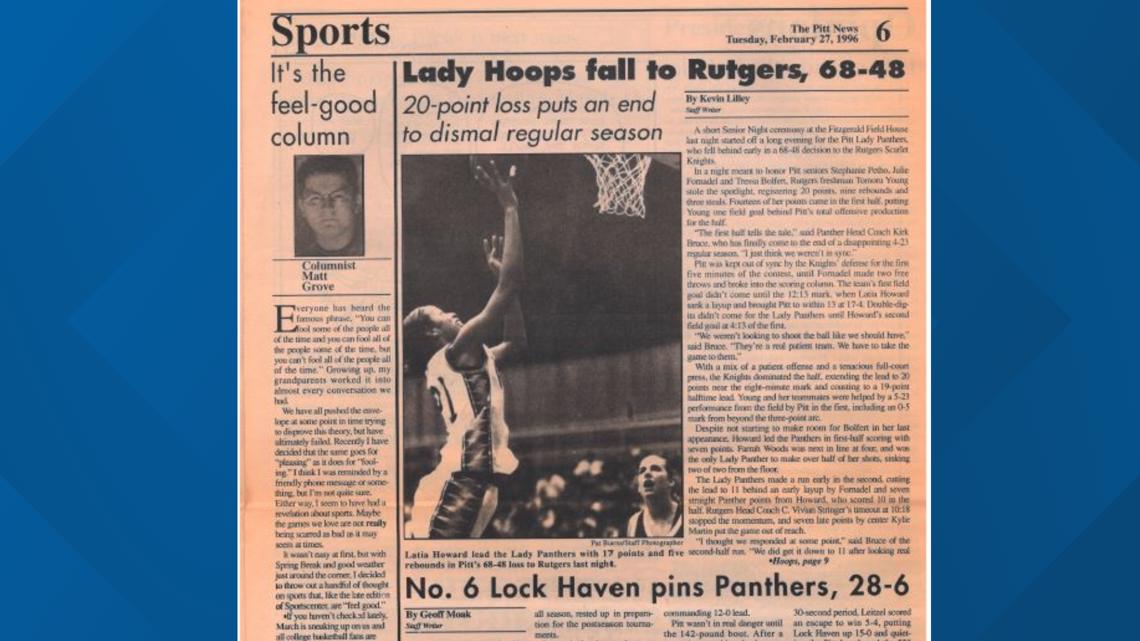PRINCE GEORGE'S COUNTY, Md. — February is American Heart Month, a time when the nation spotlights heart disease, the No. 1 killer of Americans.
One in three women is diagnosed with cardiovascular disease annually. In addition, research shows that it disproportionately affects women of color. In fact, one out of two Black and Hispanic adults have some form of cardiovascular disease, according to the American Heart Association.
On Friday, everyone is encouraged to wear red to show their support for survivors like Latia Howard.
At just 20 years old, Latia Howard had to give up her dreams of playing in the WNBA when a rare heart condition led to a stroke.
Now, she hopes to use her story to help raise awareness about the deadly disease and share the warning signs to look out for to stay on top of your heart health.
For Latia Howard, her time on the basketball court can be summed up with one motto.
"You give 100% and as long as you give 100%, then I will always be okay with the outcome of the game," said Howard.
Teaching from experience, Howard always gave 100% when she played high school basketball in Prince George's County. She graduated with over 40 scholarship offers to play basketball in college.
"I chose the University of Pittsburgh to play basketball, to be a student-athlete," said Howard.


Howard was being recruited into the WNBA when she started feeling ill and was rushed to the emergency room.
"I started feeling really tired. Had fevers, had dots in my eyes. I was in pain and I didn’t know what was going on. Finally, after months of being in pain, I took myself to the hospital and I had to stay to have emergency open-heart surgery. What I had is called endocarditis," said Howard
Latia Howard had a condition called endocarditis and later a stroke. Her recovery was a testament to her physical fitness and sheer drive to overcome as well as being taken to the hospital quickly upon recognition of stroke signs.
"Definitely shocked about the outcome of what was going on because I had no clue about it. At that age, I was an athlete, I was in perfectly good shape, actually the top athlete, but I had not known what the symptoms were for heart disease," said Howard.


According to the American Heart Association, cardiovascular disease is the number one killer of women, claiming more women's lives than all forms of cancer combined. It also disproportionately affects women of color.
"I was an athlete. On a Sunday, I was feeling perfectly fine. I was able to run, I was able to jump, I was able to do everything that an athlete does. The next day, I could not walk. I could not talk. I could not move," said Howard.
Now, Howard is a survivor and coach, helping teach important lessons both on and off the court.
"I just want to bring awareness to others because sometimes you think at a young age that you are untouchable. We are not untouchable and it starts at an early age all the way to adults," said Howard.




During American Heart Month, the American Heart Association reinforces the importance of heart health, the need for more research and efforts to ensure that millions of people live longer and healthier.
The American Heart Association wants everyone to “Know Your Numbers” – the five key personal health numbers that help determine risk for heart disease: total cholesterol, HDL (good) cholesterol, blood pressure, blood sugar and body mass index. Know your family history and talk to your doctor about heart disease.
Even modest changes to diet and lifestyle can lower risk by as much as 80% Make living a healthy lifestyle a priority by moving more, eating smart and managing blood pressure.
The American Heart Association recommends that adult women get at least 150 minutes per week of moderate activity or 75 minutes of vigorous activity.
The American Heart Association shares these five healthy tips:
Mellow Out and Reduce Stress
Stress leads to unhealthy habits like overeating, physical inactivity, smoking and risk factors for heart disease and stroke-like high blood pressure, and depression or anxiety. Incorporating music into your daily routine can help create healthy habits.
Move to the Music
Physical activity is linked to a lower risk of diseases, stronger bones and muscles, improved mental health and cognitive function and lower risk of depression.
Feed Your Soul, Rock Your Recipes
Eat meals together as a family for a chance to connect and decompress. Regular meals at home with the family reduce stress, boost self-esteem and make the whole family feel connected.
Stay on Beat with Blood Pressure
High blood pressure is a leading cause and controllable risk factor for heart disease and stroke and can contribute to worse outcomes for people who contract COVID-19.
Keep the Beat! Learn Hands-Only CPR
When a person has a cardiac arrest, survival depends on immediately receiving CPR from someone nearby.

